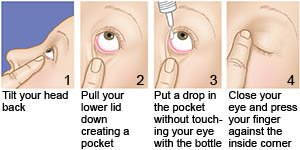Corneal Ulcer
Medically reviewed by Drugs.com. Last updated on Aug 4, 2025.
A corneal ulcer is an open sore on your cornea. The cornea is the smooth, clear outer layer of your eye. A corneal ulcer is caused by bacteria that get into your eye, such as through a scratch.
DISCHARGE INSTRUCTIONS:
Medicines:
- NSAIDs: These medicines decrease swelling, pain, and fever. NSAIDs are available without a doctor's order. Ask your healthcare provider which medicine is right for you. Ask how much to take and when to take it. Take as directed. NSAIDs can cause stomach bleeding and kidney problems if not taken correctly.
- Antibiotic eye medicine: This is given to treat an infection caused by bacteria. It may be in eyedrops or an ointment.
- Cycloplegic eye medicine: This will dilate your pupil and relax your eye muscles, which will decrease your pain.
- Pain medicines: You may be given prescription medicine to take away or decrease pain. Do not wait until the pain is severe before you take your medicine.
- Take your medicine as directed. Contact your healthcare provider if you think your medicine is not helping or if you have side effects. Tell your provider if you are allergic to any medicine. Keep a list of the medicines, vitamins, and herbs you take. Include the amounts, and when and why you take them. Bring the list or the pill bottles to follow-up visits. Carry your medicine list with you in case of an emergency.
Follow up with your healthcare provider or eye specialist within 24 hours:
You may need to see your eye specialist every 1 to 3 days if your condition is severe. Write down your questions so you remember to ask them during your visits.
Treatment options
The following list of medications are related to or used in the treatment of this condition.
Manage your symptoms:
- Apply a warm compress: Wet a washcloth with warm water and place it on your eye. This will help decrease swelling and pain. Use as often as directed.
- Clean around your eye: Gently remove any crusty buildup around your eye.
- Use eyedrops: This will keep your eyes moist and help decrease pain.

- Use safety equipment: Wear sunglasses or safety goggles to avoid another injury.
- Ask about your contacts: Do not wear contact lenses until your healthcare provider says it is okay. Always clean your contact lenses with proper contact cleaner.
Contact your healthcare provider or eye specialist if:
- Your vision gets worse.
- Your symptoms do not improve with treatment.
- You have questions or concerns about your condition or care.
Return to the emergency department if:
- You have severe eye pain.
- You lose your vision.
- You think your corneal ulcer is getting bigger.
- You injure your eye again.
© Copyright Merative 2025 Information is for End User's use only and may not be sold, redistributed or otherwise used for commercial purposes.
The above information is an educational aid only. It is not intended as medical advice for individual conditions or treatments. Talk to your doctor, nurse or pharmacist before following any medical regimen to see if it is safe and effective for you.
Learn more about Corneal Ulcer
Treatment options
Care guides
Further information
Always consult your healthcare provider to ensure the information displayed on this page applies to your personal circumstances.
